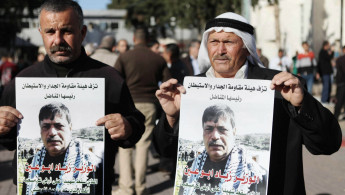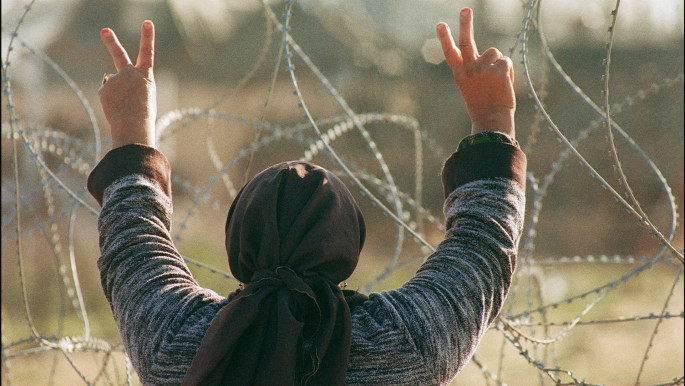Abu Ein: A life of resistance to the end
"The occupation forces are terrorising the Palestinian people."
Those were the last words heard from the Palestinian minister, Ziad Abu Ein, before he died after a confrontation with Israeli soldiers on Wednesday near Ramallah. A video of his final moments shows him collapsing on the ground, holding his chest, after being pushed by a soldier.
The video of the confrontation, which has been shared extensively on social media, has sparked outrage across the world. It shows Abu Ein and Palestinian activists clashing with Israeli soldiers, punches being thrown and one Palestinian protester being sprayed directly with tear gas.
"Nobody threw a stone, nobody attacked but this terrorist army is committing terrorist acts against the Palestinian people," Abu Ein is heard saying.
Abdullah Abu Rahma is a member of the Palestinian Authority commission against Israel's separation wall and settlements - known as CAWS - a group led by Abu Ein.
He was at the protest, and told al-Araby al-Jadeed about the events that led up to Abu Ein's death.
| The Israeli soldiers used enormous force against us and fired stun grenades and tear gas, they then brutally attacked Abu Ein. - Abdullah Abu Rahma |
"Abu Ein came to help the villages so they would be able to plant olive trees, in spite of the repeated attacks they are subjected to by Israeli settlers living nearby," he said.
"Accompanied by activists, Abu Ein tried to get to the plots of land, they were however surprised by the large presence of Israeli soldiers waiting there.
"They stopped us from proceeding ... the Israeli soldiers used enormous force against us and fired stun grenades and tear gas, they then brutally attacked Abu Ein," said Abu Rahma.
"An Israeli soldier hit him on the head with his helmet, which caused him to fall to the ground. That was when he was taken to hospital."
A life of resistance
His final words were a reflection of a life spent resisting the Israeli occupation. Ziad Mohammed Ahmed Abu Ein was born on 22 November 1955 and from an early age agitated for the end of Israeli occupation.
He was first held in Israeli custody as a teenager after being arrested on 4 November 1977, and experienced several arrests and years of imprisonment by Israel in the 1970s and 1980s.
While studying in the United States, Abu Ein was accused of murdering two Israelis in an attack in Tiberias in 1970. He was held by the US for two years before being deported to Israel in 1981, despite the UN passing seven resolutions asking the US to release him, and expressing its regret about the US decision not to. Abu Ein said he confessed under torture to the killing. His lawyer said his extradition was "almost totally political".
He was later released in a swap deal in 1985 between Israel and the Popular Front for the Liberation of Palestine-General Command (PFLP-GC).
However, he was arrested again under Israel's "Iron Fist Policy" during the first intifada and held for several years under administrative arrest - an old law dating back to the British mandate that allows Israel to jail people without trial.
He was a close friend of Fatah leader Marwan Barghouti, who was hiding in Abu Ein's home when he was captured by Israeli authorities in 2002.
Abu Ein called for the implementation of the UN's "right of return resolution 194" through the famous initiative he put forth in 2008.
He held many positions within Fatah. He was an elected member in the revolutionary council and was appointed deputy minister of prisoner affairs in 2006 before being named as the chairman of CAWS in 2014.
Palestinian anger
The Palestinian Commission of Detainees described his death as "a heinous crime, about which we cannot remain silent".
The Palestinian foreign ministry said his death was a "war crime in every sense of the word, one that is added to the series of crimes committed by Israel against the Palestinians". The ministry said that the Israeli government would pay the price in front of international courts and specialised organisations.
Usama al-Qawasmi, a spokesman for Fatah, said Israel wanted to show the Palestinian people that the price for those resisting Israeli occupation was death.
"This crime will speed up the process towards putting war criminals on trial, it confirms that we are at a real crossroads with the Israeli occupation," he said.
Qawasmi said the Palestinian leadership, headed by President Mahmoud Abbas, would take all necessary steps to respond to this crime and all crimes committed by Israel.
The National Labour Factions in Jenin also paid tribute to Abu Ein, and said that all Palestinians were targets of the Israeli occupation.
Ibrahim Khreisheh, the head of Fatah's legislative council, told al-Araby: "The assassination of a member of the Fatah revolutionary committee, Ziad Abu Ein, is a new war crime that can be added to those carried out by the occupation. Abu Ein's assassination will not deter the Palestinians from continuing their popular resistance against the occupation."
Khreisheh also said that the Palestinian political movement would continue to call for an end to the occupation and will head to the International Criminal Court to put Israeli criminals on trial.
The Popular and National Committees to resist the Wall and the Settlements called on Palestinians to resist the occupation wherever it was present.
They called on the Palestinian leadership to "quickly join the ICC and all the organisations associated with the liberation of our people from the occupation and the establishment of a Palestinian state".
Israeli media response
Some Israeli media referred to Abu Ein as a terrorist who killed Boaz Lahav and David Lankri, two Israelis, in Tiberias in 1970.
They reported that Abu Ein was released in an exchange in 1985 and that he was close to the Fatah leader, Marwan Barghouti, who is serving a life sentence in Israeli jails.
Other Israeli media outlets showed a picture of Abu Ein next to one of a settler in Tiberias, pointing out that he had killed an Israeli citizen, and also described him as a "terrorist".
This is a edited translation from our Arabic edition.




